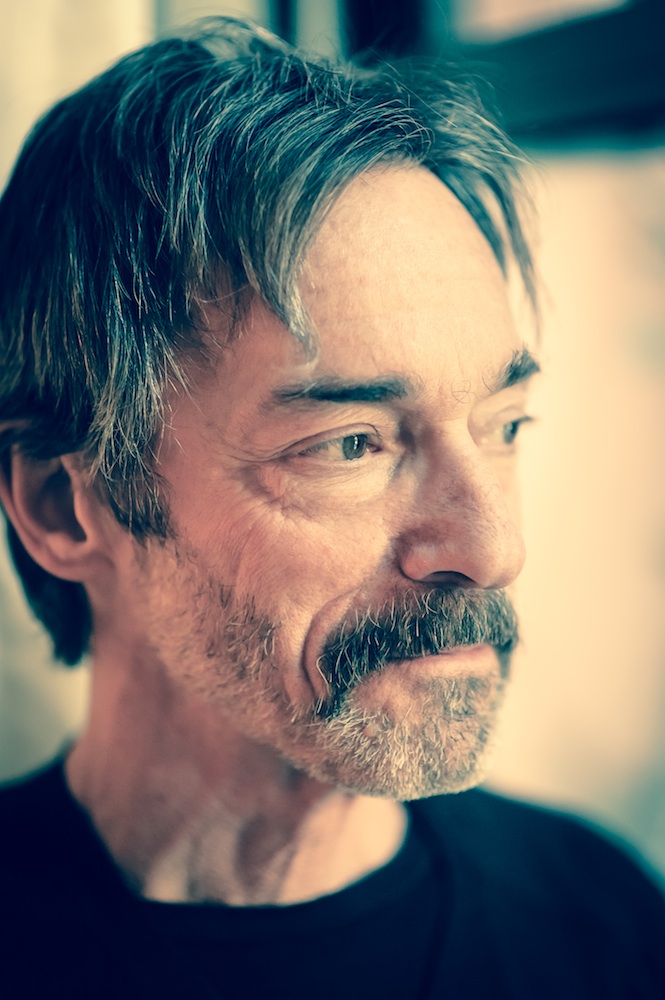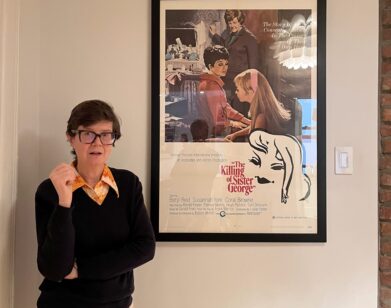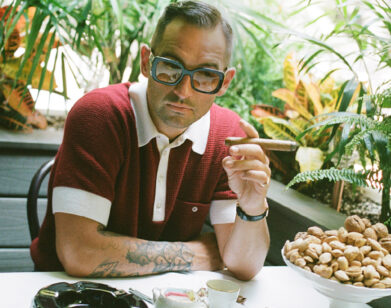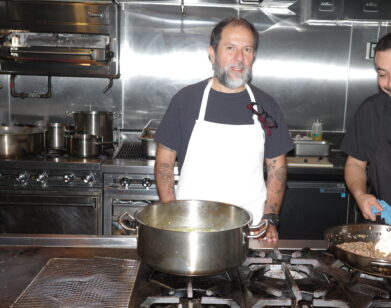Love on the Rocks

ABOVE: PETER NICHOLS. PHOTO COURTESY OF ADRIAN KINLOCH.
Set in a small British ex-pat community on the balmy holiday island of Mallorca, The Rocks (Riverhead) follows two love stories over a period of 60 years. In addition to the usual sun, sand, and souped-up sex drives, Peter Nichols’ novel also includes a drug smuggling jaunt to North Africa, a real estate swindle, a crew of thuggish Italian coastguards, and a late-in-life successful author. While it sounds like a fanciful settling for a soap opera, much of the The Rocks is inspired by the British author’s own freewheeling life: from rebelling against his private school upbringing and becoming a hippy to sailing around the world, trying his hand as an L.A. screenwriter, and, in his mid 40s, finding his true calling as an author.
JEFF VASISHTA: Clearly this novel isn’t the work of a fresh-faced creative writing grad. It’s got the feel of someone who’s lived a full life.
PETER NICHOLS: I think it’s the evasion of trying to work for a decade. I hated school and the moment I didn’t have to go, I stopped. I liked writing so I got some jobs writing in England. I lived on a small boat for a long time and sailed across the Atlantic and around the Caribbean and Mediterranean. My boat sank and I crawled ashore. I was in my 30s and thought I better do something.
VASISHTA: How did you support yourself?
NICHOLS: I worked as a grunt—a deckhand—and then got married and got a job as a Captain. I took people out on charter boats. I remember once we sailed through the Bahamas for three months and spent 150 dollars for that entire time and that was for beer and ice cream when we went ashore. We had rice on the boat and I shot fish with a harpoon. I had to come up with four fish a day for me, my wife, and our two cats. We mixed that with rice and would get vegetables when we went ashore. I couldn’t stand it after a while. I wanted to go ashore and live with people and my wife wanted to stay on a boat so we broke up.
VASISHTA: So how did you become a writer?
NICHOLS: Being on boats for many years there was no TV so I read. I kept this fantasy alive of being a writer. When I left school I worked in advertising and did some journalism, which didn’t seem like work.
VASISHTA: You also tried screenwriting.
NICHOLS: Yeah. I lived in L.A. for a while working on screenplays. None were ever produced. I fell into that thing that many people do out there, where I got agents and stuff was optioned and commissioned, and I made a little money—not a lot but enough to make me believe that something might happen.
VASISHTA: But then things did happen.
NICHOLS: I realized that I had this life on the boat that no one knew about and I’d begun to forget about it. I thought I’d try to write something about all that, in particular sailing across the Atlantic when my boat sank. That was the subject of my first book, Sea Change (1997). I sent it to an agent at ICM in New York. One day I got a call from a guy called Sloan Harris; he had read the first 50 pages of my book and said he thought he could sell it. That seemed a lot more real to me than writing screenplays where I was always relying on other people. I had a cousin in the Bay Area, outside San Francisco, and he told me that there was a shack next door by the pool that they were renting for 400 dollars a month. I said I’d take it. That’s where I wrote my book and it got published and the next one got published.
VASISHTA: The Rocks is a bit of a departure because it’s not specifically about sailing.
NICHOLS: After my books started to get published I was asked to teach as a visiting professor at different colleges. They were good ones: Georgetown University, NYU in Paris, Bowdoin College in Maine. I went back to school to get an MFA four or five years ago as I felt washed up. I was writing all these maritime non-fiction books. I did write one novel, but I no longer wanted to write about boats. I wanted to write about fiction in a way that I’d never written about it before. I went to Antioch University in Los Angeles and did an MFA. The Rocks was my main project during my two years there.
VASISHTA: How did you come up with the story?
NICHOLS: Much of the novel came from my background of disappointing and failed relationships. But I had these two old people who die at the beginning of the novel and so I realized that the best way to tell their story was to go back in time every 10 years. I was reading The Line of Beauty by Alan Hollinghurst, which won the Booker Prize, and Philip Hensher’s The Northern Clemency, which was Booker-nominated. What I liked about those books was that they had no plot, but unfolded and showed different episodes in characters’ lives. It left it up to the reader to fill in the backstory.
VASISHTA: The character of Lulu is exasperating—horrifying, really. She seduces Charlie when she’s 70 and he’s 15.
NICHOLS: Lulu is just impenetrable. She has to be in absolute control. Once she popped on the page I wanted to explore her and see how awful she could get. The book has been published in England and there are a couple of Amazon reviewers who have said, “This is pedophilia, I can’t read on.” I stand back and let Lulu do what she would do. I think she did it extremely mindfully—she did it with a cold, snake-like sweetness. I think she’s fucking over Gerald and his whole family at the same time and there’s a base need going on. She likes to fuck. Physically, she’s based on an amalgam of people I’ve met who are older. Sex moves from being in the body to in the head. Someone like Lulu wants to get it and she wants to see if she can still get it. It’s a challenge. She’s eternally young and people are in awe of her even though she’s a monster. Only a few people know what kind of monster she was.
VASISHTA: The novel hangs on the scene with the Italian coastguards.
NICHOLS: Years ago, when I was living with my first wife on our little boat in the Mediterranean and we were moored of Beaulieu-sur-Mer near Nice in the south of France, this customs boat pulled up beside us and this swarthy Corsican was flirting with my wife on the boat, bothering her. Finally I asked, “Can I help you?” He didn’t like my attitude; I didn’t like his. He went below and put on his uniform and he said, “Prepare for inspection.” He came aboard looking for contraband—him and two others. All this time I felt intense focus on my wife who was very attractive. I was very nervous because they were just thugs. So that scene came directly from that.
VASISHTA: The road trip to Marrakesh when Luc and Aegina start off buying shirts and unwittingly wind up smuggling hash was another strong section with very vivid details. Where did that come from?
NICHOLS: I’ve done both shirt buying and hash smuggling in Morocco, so a lot of that came from life. In Sea Change, I wrote about how I sailed down to Morocco in my early 20s and we loaded it up with hashish. The character of Rolf is based on a guy I knew. A lot of people were busted by the Spanish police. At one point I was buying black and white Moroccan shirts and selling them on the Kings Road in London in the early ’70s.
VASISHTA: And from that nefarious existence you’ve gone onto a respectable one teaching MFA courses.
NICHOLS: I love connecting with writers and I feel that I’m in the same place. I don’t think I could teach full time, though, because I don’t like academia. I don’t like the political stuff that goes on in departments. Most of the time I sit at home, procrastinate, and try to write. I do write for six to eights hours a day, I teach and just manage to scrape together a living.
THE ROCKS IS OUT TODAY, MAY 26, VIA RIVERHEAD.






